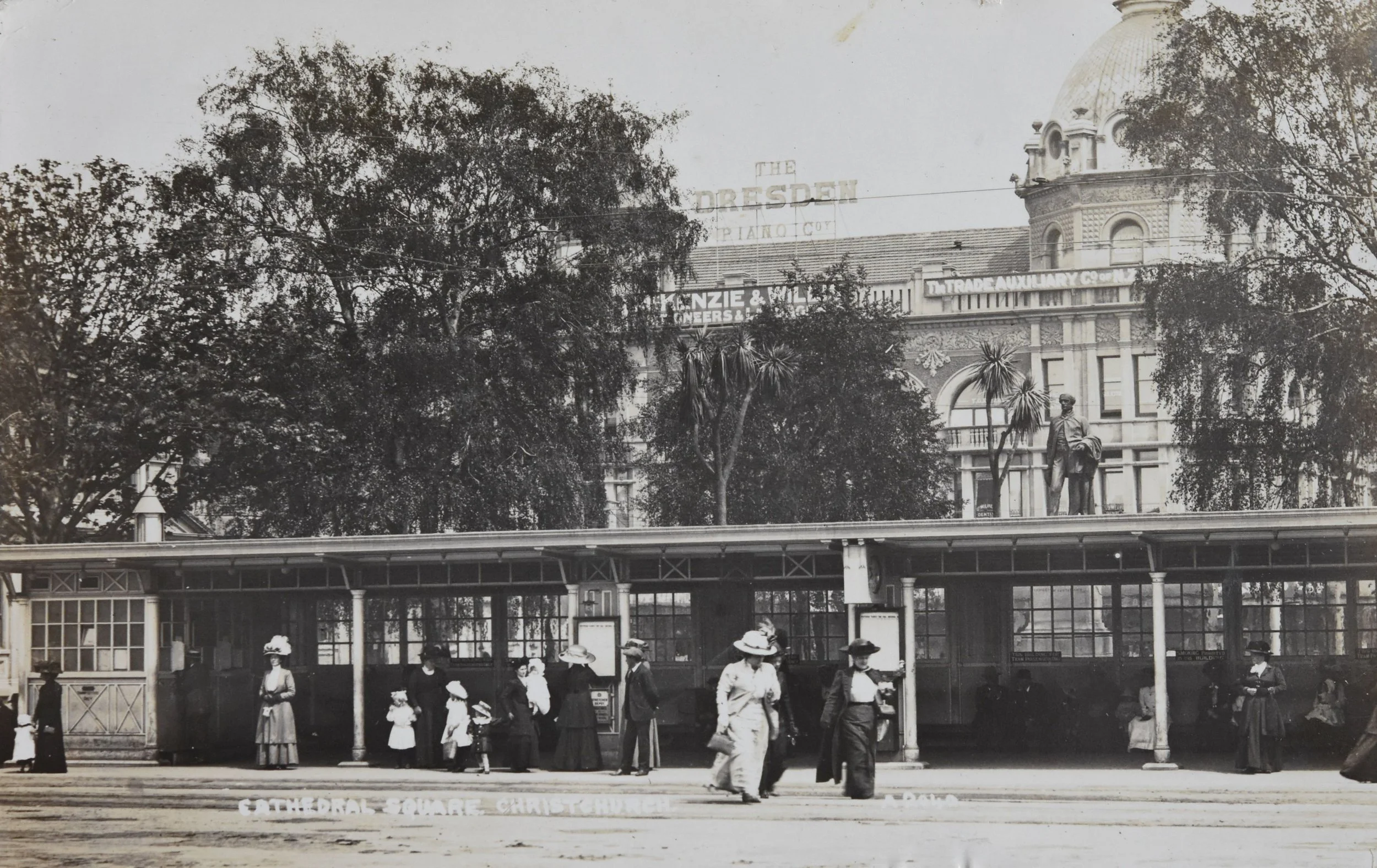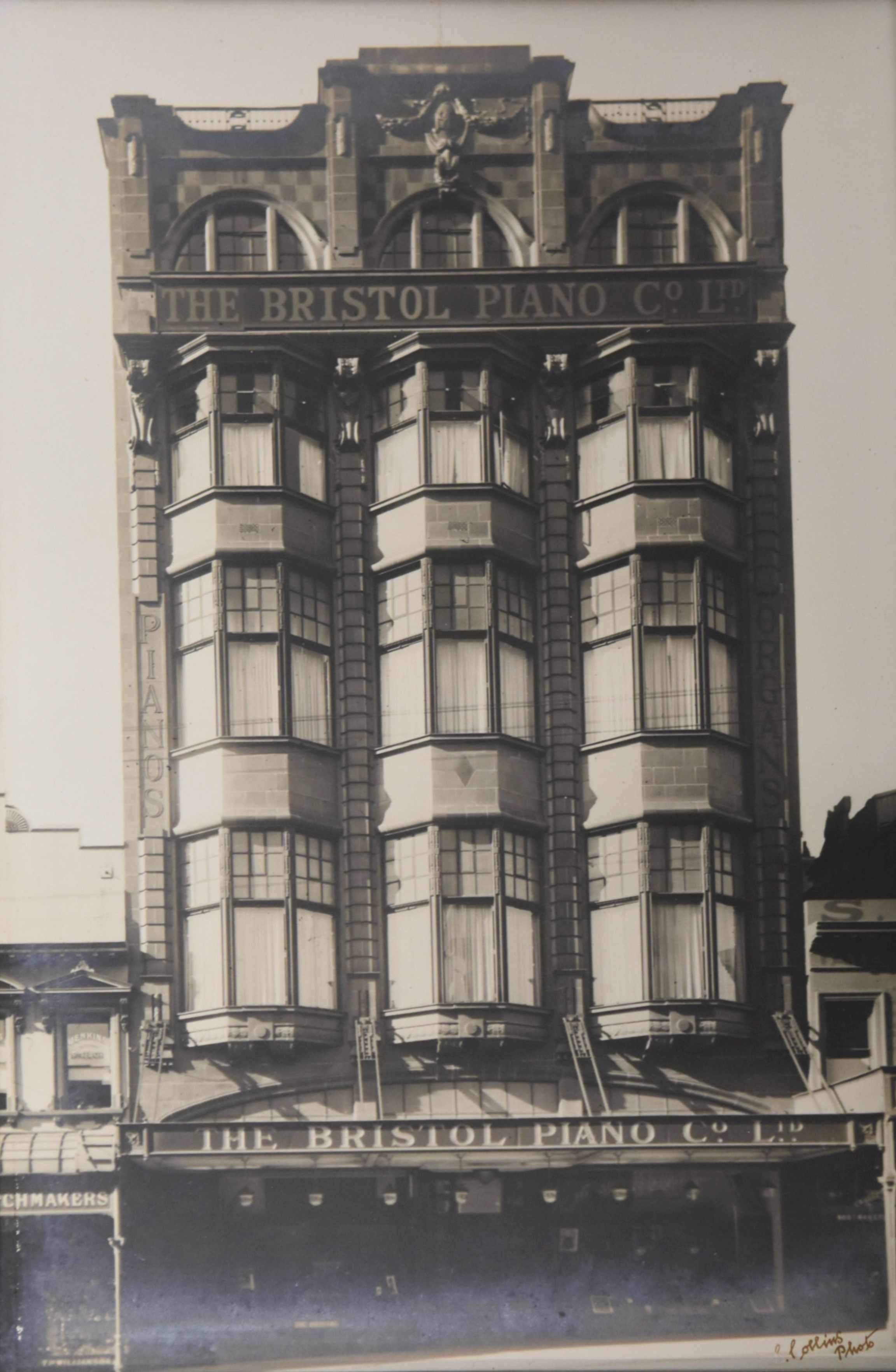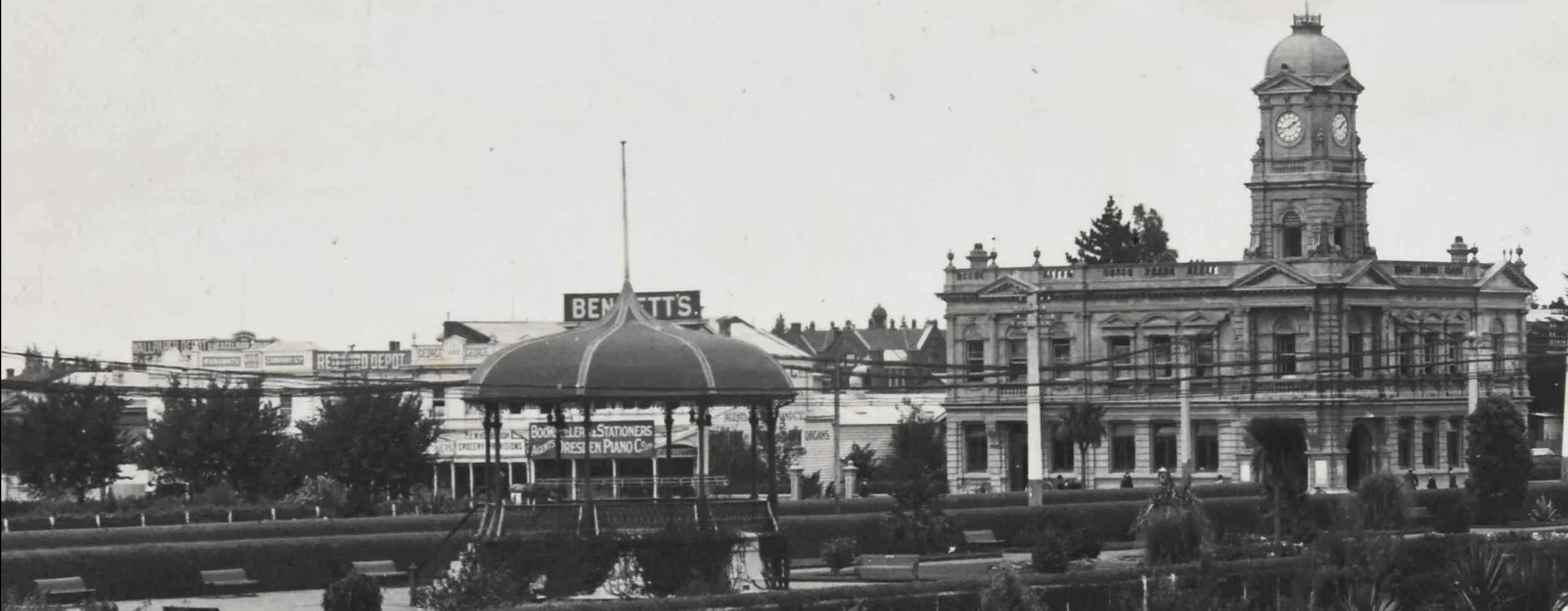This sign is at Shantytown, near Greymouth.
Recently I obtained a little book that contains the monthly payments for a piano bought from The Dresden Piano Company Ltd in 1913. The lady who was buying the piano took four years to pay off the piano by monthly payments of a pound, so the cost of 48pounds. Unfortunately, there doesn’t seem to be any information about what kind of piano was bought. There is an entry in pen that reads 55 gns which could be referring to the weight of the piano. Every month a payment was made, a small yellow sticker has been stuck into the book as a receipt. Throughout the book are pages of advertising for other products that the Dresden Piano Company sell along with a statement - Important! - Should anyone attempt or threaten to seize the Instrument you should give prompt information to the Company, which will protect you. A letter should be sent immediately, addressed to - “The Manager of The Dresden Piano Co. Ltd. at Wellington”.
According to the NZ Dictionary of Biography, David Edward Theomin, was born as David Ezekiel Benjamin in Bristol, UK on the 25th April 1952. His father, Joseph Benjamin was a Jewish minister. Joseph had come to the UK from Prussia, and when he arrived in the UK he changed his name to Benjamin. His father married twice, David’s mother was Joseph’s second wife. David was one of six, he had a younger sister, an older half-sister and two older half-brothers. David received his education from Wharton’s School, and then at Bristol Grammar for three years from 1862. After leaving school he worked as an apprentice in the hardware trade. David left the UK for Melbourne in 1874, where his half-brother, Abraham Benjamin lived.
In the Evening Star obituary for David Theomin dated 15th July 1933, it states that he served a five year apprenticeship with Mr M. Blanckensee (sic), a merchant who traded between the West of England and the African Gold Coast. Later he entered the employ of Platnauer Bros., and he remained there for three years. In 1874 he went to his brother in Melbourne and was in the employ of Philip Falk and Co, wholesale jewelers. Finding the climate tiring, he came to New Zealand in 1878.
Argus Melbourne 1st February 1879
David Benjamin first visited NZ in 1878. He married Mary Ann (known as Marie) Michaelis who was the eldest daughter of Melbourne businessman, Moritz Michaelis on the 21st January 1879 in Melbourne. David and Marie had two children, Edward and Dorothy.
David and Marie moved to Dunedin later in 1879 and David helped to set up a tannery for Marie’s father in Sawyers Bay. By 1880 the firm D. Benjamin and Company had opened for business in Princes St, Dunedin as wholesalers and importers. David Benjamin changed his name to Theomin by deed poll in 1885, the name his father had used in Prussia.
Marie Theomin had twin sisters living in Dunedin and their husbands were, Jack Isaacs and Hyam Hart, partners of Hallensteins.
In late 1883 the Dresden Pianoforte Manufacturing Agency and Company (renamed the Bristol Piano Company during the First World War) was formed to meet the rising demand for musical instruments. Branches were opened all over the country.
Fergusson and Mitchell (Firm). Princess Theatre Dunedin. Commencing Monday 13th February 1888 and following nights, Grand production of Planquette's masterpiece, "Les cloches de Corneville; or, The chimes of Normandy" by the Pinafore Opera Company. Fergusson & Mitchell lith [1888]. [Theatre programmes for opera performances in New Zealand. 1880s].. Ref: Eph-B-OPERA-1888-01. Alexander Turnbull Library, Wellington, New Zealand. /records/22655700
During the years 1904 and 1906, Theomin had a 35 room house built in Royal Terrace, Dunedin which was named Olveston after a village near Bristol, UK where Theomin had enjoyed holidays when he was a child. In the coming years, the house was filled with Theomin’s collection of European and Oriental treasures.
Evening Star 17th August 1908
From personal photo collection.
From personal photo collection.
There is an entry in the NZ Truth dated 1st May 1915, ‘Claude Blankenstein, the grandson of Moses Blankenstein, with whom Mr David Theomin of Dunedin, served his apprenticeship in Bristol, England, left with last Dunedin contingent to serve his King and Country’.
Theomin was active in many aspects of Dunedin life. The following are some of the organisations he contributed to - Jewish activities, Dunedin Public Art Gallery (helped to support Frances Hodgkins), Royal Dunedin Male Choir, Shipwreck Relief Society, Otago Patriotic Association, Patients’ and Prisoners’ Aid Society, Dunedin City Sinking Fund (set up to free Dunedin from debt) and the Dunedin Chamber of Commerce (was it representative at the inauguration of the Commonwealth of Australis and at the coronation of King Edward VII in 1902).
Theomin died at the age of 81 on the 15th July 1933. He, along with his wife, is buried in the Jewish section of the Dunedin Southern Cemetery. His wife and son predeceased him. His daughter Dorothy, who died in 1966, left in her will, Olveston and its contents to the citizens of Dunedin.
There is a long obituary to David Theomin in the Evening Star dated 17th July 1933.
Bristol Piano Company, Dunedin c1925. Hocken Digital Collections. Reference Number: MS-4209/001 Names: Bristol Piano Company Limited Collection: Ōtepoti / Dunedin Collection: Bristol Piano Company : Photograph board Parent Record: MS-4209
Dresden Piano Company
The first advertisements I can locate for this company are in late 1883. The company is located in 27 Princes St, Dunedin. In 1885, an advertisement for the company states that its premises are at 31 Princes St, Dunedin, they are the youngest music and importing firm in New Zealand, that they have trebled their business in the last six months, they advertise the Mignon and Haake pianos and state that their pianos only require tuning at long intervals.
According to David Theomin’s obituary dated 15th July 1933, the Dresden Piano Company came into being because a business in Dunedin that had been selling pianos was trying to increase sales. The Dresden Piano Company was formed as a new company to specialize in pianos to answer this demand with help and staff from the other piano company.
In the Otago Daily Times dated 26th August 1914, it states that there were two big music firms at the end of the 19C, Charles Begg and Company and The Dresden Pianoforte Manufacturing and Agency Company. The head offices of these two business were right next door to each other in Princes St. The premises of The Dresden included a music warehouse with a large stock of sheet music and other goods, piano and organ showrooms, piano-manufacturing workshops, a concert room and rooms for professional music teachers. The hire-purchase scheme was highly innovative, and by 1907 The Dresden had 258 employees and there were branches or agencies in 60 towns throughout New Zealand.
The Press 11th April 1911
An advertisement in 1888 has the company advertising not only pianos, but also organs harmoniums, brass, reed and string instruments along with a gigantic stock of sheet music. There is a gift coupon which readers have to collect 40 of between a particular timeframe, these coupons along with a voucher have to be forwarded to the Dresden Piano Company certifying that the reader has bought from the Dresden Piano Company sheet music to the cost of ten shillings. These people go in a draw for a piano.
Otago Witness 7th February 1888
By 1895, the Company has expanded to other areas of the country. For example, the following advertisement endorses the piano that was supplied by the Dresden Piano Company for a concert in Invercargill.
Southern Cross 9th February 1895
In an advertisement in 1899, the pianos the Dresden Piano Company are importing are John Broadwood and Sons, Collard and Collard, Lipp and Sohne, Schwechten, Bohm as well as others that are not named.
In an advertisement in 1905, the company is now importing Steinway, Erard and Collinson pianos as well. The advertisement states that a good piano improves with age with the tone becoming brighter and the action easier, whereas a poor piano does not improve and soon displays its real character advertisement discussed the time-payment system for purchasing a piano.
Pianos in a music shop, probably The Dresden Company shop in Cathedral Square, Christchurch. Photograph taken in 1909 by Steffano Webb. Shows a Steinway grand piano in the centre, surrounded by pianos by Ronisch, Koch and sons, Collard and Collard, Kirchner, Bohm, and Broadwood.
Pianos in a music shop. Webb, Steffano, 1880-1967: Collection of negatives. Ref: 1/1-003990-G. Alexander Turnbull Library, Wellington, New Zealand. /records/22597531
From an article in the Otago Daily Times dated 26th August 2014, a new building for the company was built in 1912, and in the following year, Theomin had another branch building constructed in Cashel St, Christchurch. In 1912, the piano was at is peak in popularity in New Zealand, with most pianos imported into New Zealand in that year. Annual imports had increased gradually from 1200 in 1878 to 5700 in 1912. Most of the pianos The Dresden imported were German and according to the article, there is evidence that there was prejudice against the firm and its owners.
Poverty Bay Herald 1st September 1912
Advertisement from programme for the Theatre Royal, Christchurch 1913 for the ballet performance of Adeline Genee and the Imperial Russian Ballet.
In 1914, the company is having a piano sale, some of the pianos were acquired when the company purchased the entire stock of the Wellington Piano Co., Ltd.
From personal photo collection. Bennett’s Bookshop is an agent for Dresden Piano Company.


First photo is from personal collection.
Second photo - Cathedral Square, Christchurch, showing tram shelter, Central Post Office , and signs advertising The Dresden Piano Company and J Porter, builder and contractor. The Press (Newspaper) :Negatives. Ref: 1/1-017897-G. Alexander Turnbull Library, Wellington, New Zealand. /records/29946751
Mount Ida Chronicle 30th January 1914
The Company placed advertisements in 1915 regarding their change of name to The Bristol Piano Company. Their advertisement states, that when the company first started the name ‘The Dresden was associated honourably with all that is best in art and music however the name is no longer acceptable for us. The shareholders and Directors are without exception British born and bred and are resident under the British flag. Bristol is the birthplace of the Founder and present Chairman of Directors of the Company’. And they hope that the public fully appreciate the change of title to The Bristol Piano Co., Ltd.
Otautau Standard and Wallace County Chronicle 19th January 1915
There is a photo board in the Hocken Collections of Otago University. In the piano room of the Bristol Piano Company the names of the pianos that are visible are Collard and Collard, Broadwood and Sames. Both uprights and grands are being sold by the company.
Bristol Instrument section and Box Office. c1925
Hocken Digital Collections. Reference Number: MS-4209/003 Names: Bristol Piano Company Limited Collection: Ōtepoti / Dunedin Collection: Bristol Piano Company : Photograph board Parent Record: MS-4209
Bristol Sheet Music Department c1925.
Hocken Digital Collections. Reference Number: MS-4209/002 Names: Bristol Piano Company Limited Collection: Ōtepoti / Dunedin Collection: Bristol Piano Company : Photograph board Parent Record: MS-4209
The Barth School of Music was one of The Dresden Piano’s long-standing tenants and the school was run by three sisters, Beatrice, Irene and Ruby. Each had a room on the fourth floor for giving individual lessons and there was a classroom where theory was taught and meetings held.
By the early 1930s though it looks as if the company is being affected by the Depression with some of its stores moving into smaller premises. In addition to this, new forms of entertainment affected the sales of pianos too. In 1933, The Dresden building in Princes St was sold, the company moved to Dowling St and ceased trading in Dunedin in 1936.
By 1938, the Bristol Piano Company Ltd has gone into voluntary liquidation. Some of its buildings in Wellington are for sale.
Evening Post 24th November 1938
Auckland Star 18th March 1925
Bristol Piano Company Ltd, Karangahape Road, Auckland. Price, William Archer, 1866-1948 :Collection of post card negatives. Ref: 1/2-001953-G. Alexander Turnbull Library, Wellington, New Zealand.
Document owned by website owner.
From personal ephemera collection.
References
Dictionary of New Zealand Biography
PapersPast, National Library of New Zealand
Otago Daily Times












































